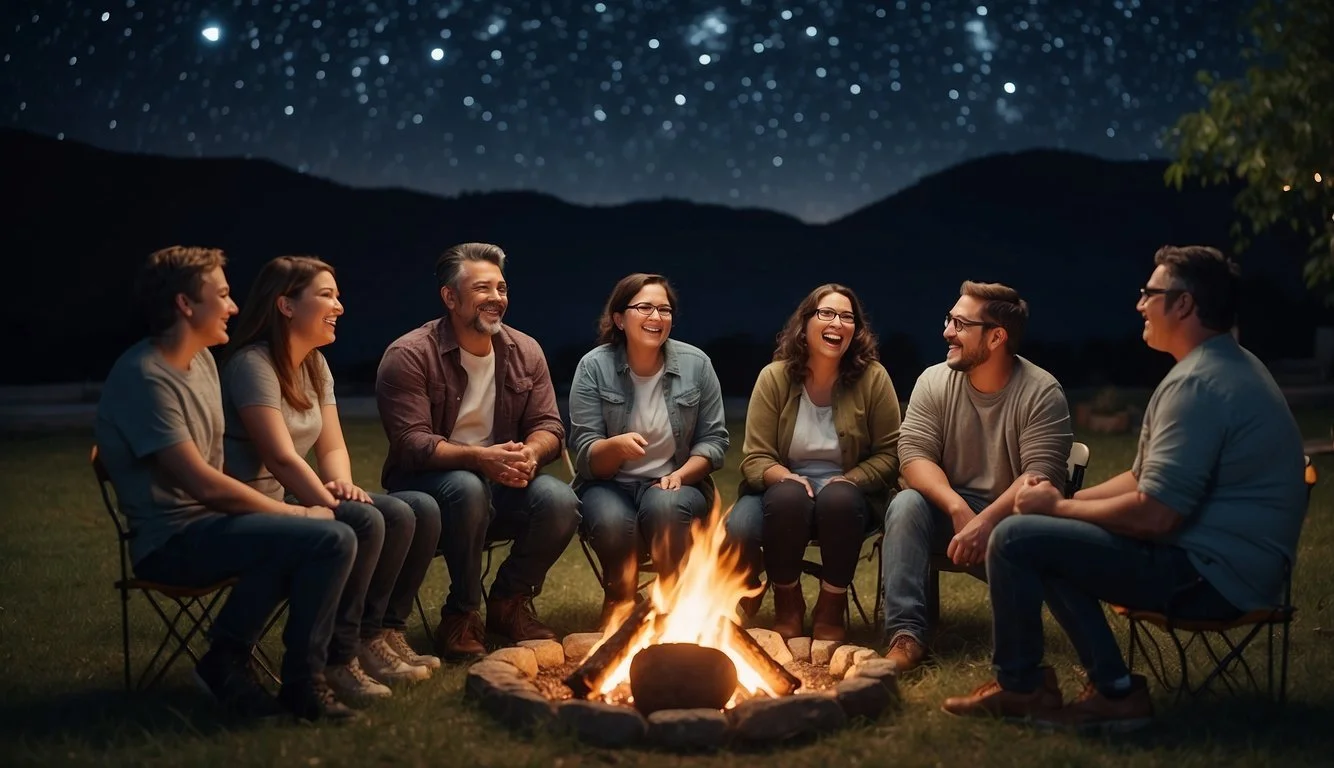Documentary Review: Crip Camp (2020)
A Transformative Journey into Disability Rights
"Crip Camp: A Disability Revolution" is a 2020 documentary that garnered significant attention for its powerful portrayal of a groundbreaking summer camp for people with disabilities. Set against the backdrop of the late 1960s, Camp Jened in New York served as a formative place where campers found freedom and community. These experiences were not just about fun summers; they played a crucial role in shaping the disability rights movement.
The film expertly weaves together archival footage and heartfelt interviews, offering a moving narrative that emphasizes the impact of these early experiences on the fight for equality. It highlights how the campers' transformative time at Camp Jened empowered them to become activists, fighting for civil rights and accessibility for all. This aspect provides valuable insights into how personal histories intersect with larger social movements.
Viewers are drawn into a world where the struggles and triumphs of the disabled community are depicted with authenticity and respect. "Crip Camp" is not just a documentary; it is a celebration of resilience and a call to action for continued progress in disability rights. This remarkable story invites reflection on how far society has come and how much further it still needs to go.
Background on 'Crip Camp'
"Crip Camp", a 2020 documentary, shines a light on a groundbreaking summer camp called Camp Jened. Founded in the 1950s, this camp was located in the Catskills of New York and catered to teenagers with disabilities.
Camp Jened was much more than a typical summer camp. It promoted an inclusive environment where campers felt a sense of belonging and freedom. Many attendees experienced for the first time a community that understood and accommodated their needs.
The documentary, directed by Nicole Newnham and Jim Lebrecht, who himself was a former camper, explores the impact of Camp Jened on the disability rights movement. It showcases how the experiences at this camp fostered a sense of empowerment among its attendees.
Featuring archival footage and interviews with former campers, "Crip Camp" highlights the transition from shared personal experiences at Camp Jened to collective activism. Campers went on to become prominent voices in the disability rights movement, advocating for significant legislative changes.
The film not only recounts fond memories of summertime activities but also covers the profound sense of solidarity and activism that emerged. This unique setting provided a space where young people with disabilities could envision a world with more accessibility and rights.
Camp Jened's influence extended far beyond its physical boundaries, illustrating how a small camp became a catalyst for broader societal change. The film captures both the personal and political awakenings that took place, marking a pivotal chapter in the history of disability rights in the United States.
Overview of the Film
"Crip Camp: A Disability Revolution" is a 2020 documentary directed by Nicole Newnham and James LeBrecht. It explores the impact of a summer camp on the disability rights movement.
Synopsis
The documentary starts in the early 1970s at Camp Jened, a summer retreat for teenagers with disabilities in New York. The camp provided a communal space where campers could experience a sense of freedom and equality.
Archival footage shows the daily life at the camp, highlighting the friendships and personal growth of its attendees. The film then transitions to the significant role these campers played in advocating for disability rights, leading to the landmark Americans with Disabilities Act (ADA) of 1990.
Key Themes and Messages
"Crip Camp" touches on several major themes, including equality, inclusion, and the power of grassroots activism. It emphasizes how formative experiences at Camp Jened inspired many to become leaders in the disability rights movement.
The documentary also highlights the systemic barriers faced by people with disabilities. By showcasing the struggles and triumphs of its subjects, it portrays a powerful message about the importance of community and the enduring fight for civil rights.
Production and Development
"Crip Camp: A Disability Revolution" offers an insightful exploration of the creation and impact of Camp Jened. The development of the documentary was robustly supported by notable figures, production companies, and various funding sources.
Directors and Producers
The film was directed by Nicole Newnham and Jim LeBrecht. LeBrecht, who has Spina Bifida, was not only instrumental in directing but also shared his personal experiences as a former camper at Camp Jened. Nicole Newnham brought her extensive documentary filmmaking experience to the project, ensuring a well-rounded narrative.
Higher Ground Productions, founded by Barack and Michelle Obama, served as one of the producers, lending significant credibility and support to the project. Their involvement underscored the documentary's social and political relevance.
Creation Process
The development process followed a typical documentary structure, employing various storytelling techniques. First-person interviews, known as "talking heads," played a key role in providing personal insights from former campers and staff. Archival footage and still images were meticulously selected to illustrate the camp's history and impact.
Stock footage was used sparingly to add context and emphasize key moments. The directors aimed to create a narrative that was both engaging and educational, capturing the essence of Camp Jened and its role in the disability rights movement.
Funding and Support
Multiple sources of funding and support were critical to the documentary's production. Besides Higher Ground Productions, backing came from organizations like the Ford Foundation and Just Films. These funding sources ensured that the documentary had the financial resources needed for comprehensive research, filming, and post-production.
The collaboration of these reputable entities not only provided financial support but also helped in amplifying the documentary's reach. Their involvement emphasized the broader social and political impact, aligning with the message of disability rights and inclusion.
Critical Reception
Crip Camp (2020) has garnered significant recognition for its inspirational storytelling, detailed historical narrative, and emotional impact. It has received high praise from critics, earned several awards, and resonated deeply with a broad audience.
Critical Acclaim
Critics have lauded Crip Camp for its insightful depiction of a pivotal moment in the disability rights movement. The film’s innovative blend of personal stories and historical context has been particularly praised. Reviews from notable sources like RogerEbert.com highlight its powerful use of archival footage and compelling interviews. The film is also commended for its direction by Nicole Newnham and Jim Lebrecht, offering a poignant look into how formative experiences at Camp Jened shaped future activists.
Awards and Nominations
Crip Camp has received numerous accolades in recognition of its impact and excellence. It was a standout at the Sundance Film Festival, winning the Audience Award. Additionally, it received a nomination for Best Documentary Feature at the Academy Awards. The film's critical acclaim at festivals and award shows underscores its significance and the quality of its production.
Audience Response
The response from general audiences has been overwhelmingly positive. Viewers have found the film both moving and enlightening, often expressing that it has deepened their understanding of the disability rights movement. Crip Camp’s ability to connect emotionally with viewers is often cited in reviews and social media discussions. The combination of personal storytelling and its broader social message has left a lasting impression on a diverse audience.
Cultural and Social Impact
"Crip Camp" significantly changes how society perceives disability and contributes to advancing disability rights while providing an educational resource about the history of the disability movement.
Representation of Disability
"Crip Camp" offers a profound representation of disability by showcasing the real lives of individuals with disabilities, their aspirations, and their fights for equality. The documentary highlights personal stories, placing the voices of disabled individuals at the forefront. This shifts the narrative from pity to empowerment, portraying the campers as active participants in their own stories. Including authentic experiences helps dismantle stereotypes and encourages viewers to reconsider societal attitudes toward disability.
Influence on Disability Rights
The impact of Camp Jened extends beyond its idyllic setting, igniting a crucial movement for disability rights. Former campers played key roles in landmark disability legislation, including the Americans with Disabilities Act (ADA). The film traces how their camp experiences fostered a sense of solidarity and activism that translated into real-world change. This underscores the camp's role as a catalyst for broader social and political movements, reshaping accessibility and inclusion standards in the United States.
Educational Usage
"Crip Camp" serves as a critical educational tool by providing an in-depth look at the origins of the disability rights movement. Its inclusion in academic curricula spanning history, sociology, and disability studies enhances students' understanding of civil rights struggles. Educators can utilize the documentary to spark discussions on activism, legislative advocacy, and social justice. Its portrayal of historical events offers a tangible connection to the ongoing fight for disability rights, making it a valuable resource for both teaching and learning.
Technical Aspects
"Crip Camp (2020)" excels in its technical execution, demonstrating exceptional craftsmanship in cinematography, soundtrack, and editing. These elements work cohesively to enhance the storytelling and emotional impact of the documentary.
Cinematography
The cinematography in "Crip Camp" masterfully blends vintage footage with contemporary interviews. Directed by Nicole Newnham and Jim LeBrecht, the film features about 40 minutes of raw, black-and-white cinéma vérité footage from the 1970s. This historical footage, interspersed with modern-day interviews, creates a vivid juxtaposition that brings the viewer closer to the era and experiences of the campers. Careful attention to lighting and shot composition in the interviews ensures that the subjects are presented in a dignified and respectful manner.
Soundtrack and Music
The soundtrack plays a crucial role in setting the tone throughout "Crip Camp." It includes a mix of period-appropriate music and an original score that underscores the documentary's emotional beats. The use of songs from the 1960s and 1970s helps establish the historical context, while the original score by musician Bear McCreary adds a layer of emotional resonance. This combination of historic and contemporary music choices supports the narrative flow and keeps the viewer engaged.
Editing
Editing is a standout feature in "Crip Camp," effectively weaving together archival footage with current-day interviews. The editors expertly timed cuts to maintain a cohesive narrative while ensuring that each segment of the documentary builds upon the last. The seamless integration of past and present highlights the ongoing impact of the community established at Camp Jened. By utilizing a mix of quick cuts, slow-motion sequences, and flashbacks, the editors manage to create a dynamic and poignant viewing experience. The balance of historical documentation and personal storytelling is achieved without sacrificing pace or clarity.
Comparative Analysis
"Crip Camp" sets itself apart from other disability documentaries by focusing on how a small summer camp ignited a powerful movement. This section examines how "Crip Camp" stands in comparison to other films within the genre and its broader context.
Comparison with Other Disability Documentaries
"Crip Camp" distinguishes itself through its unique focus on Camp Jened. Unlike "The Untouchables" which emphasizes individual triumphs of people with disabilities, "Crip Camp" delves into collective action.
Many documentaries highlight personal struggles and accomplishments. In contrast, "Crip Camp" portrays communal experiences and political activism.
The use of archival footage and personal interviews provides a raw, authentic narrative. Moreover, the film’s emphasis on a grassroots movement makes it both educational and inspiring, setting a benchmark within the genre.
Stand in Genre Context
As a documentary, "Crip Camp" exemplifies how genre conventions can blend personal stories with historical context. The film is a poignant chronicle of the Disability Rights Movement, highlighting a transformative period in civil rights history.
"Crip Camp" strikes a balance between nostalgic recollection and socio-political commentary. Its emphasis on inclusive history fills a significant gap in social justice narratives.
The documentary's candid and engaging style, partnered with its historical importance, categorizes it as a crucial educational resource. The film not only informs but also encourages deeper societal reflections on disability rights and activism.
Personal Reflections
Watching Crip Camp is an enlightening experience that provides a profound look into the world of disability activism. The filmmakers, Nicole Newnham and Jim Lebrecht, use their talents to craft a narrative that is both personal and universal.
The archival footage from Camp Jened reveals a time capsule of unfiltered joy and struggle. These moments are not just historical snapshots but windows into the lives of people who shaped a movement.
In the present day, seeing former campers reunite highlights the lasting impact of their shared experiences. The sense of camaraderie and empowerment they gained at the camp transcends time and remains palpable.
The documentary's candid conversations about sex and relationships among people with disabilities are particularly impactful. This breaks down societal taboos and offers a more humanizing perspective.
For anyone interested in social justice, Crip Camp serves as a critical reminder of how grassroots activism drives change. It is a real eye-opener on the importance of accessibility and inclusion.
The simplicity in filmmaking style ensures that the story remains the focal point. This allows the personal stories of the campers and their testimonies to resonate even more strongly.
In essence, Crip Camp not only educates but also inspires. It leaves the audience with a deeper appreciation for the challenges and triumphs of the disability rights movement.
Conclusion
"Crip Camp: A Disability Revolution" is more than just a documentary; it's a pivotal narrative about the transformation of the disability rights movement. This film chronicles the journey from a summer camp to a broader, impactful push for equality.
The film effectively combines interviews with historical archive footage. This creates a compelling story that highlights the resilience and determination of the individuals involved.
Directed by Nicole Newnham and Jim Lebrecht, the film paints an intimate yet powerful portrayal of its subjects, giving voice to those who have often been marginalized.
Key themes include:
The importance of community support
The struggle for civil rights
Personal empowerment through collective action
With its rich historical context and personal stories, "Crip Camp" stands as a testament to the progress made and the ongoing journey toward accessibility and inclusion.
For anyone interested in social movements, this film is an insightful and moving exploration of the fight for disability rights.




